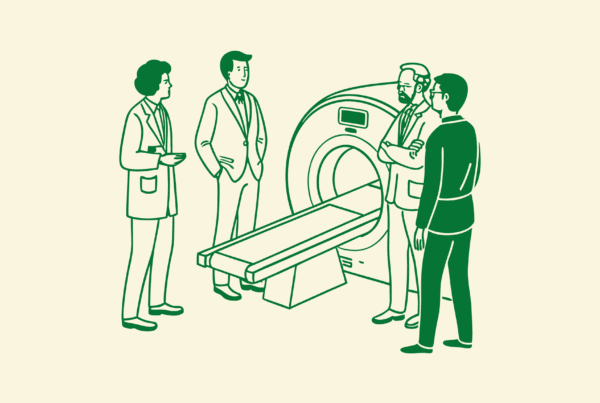Selling your Columbus, OH, cardiology practice presents a significant opportunity in today’s active market. With strong buyer demand and rising valuations, strategic preparation is key to navigating the sale and achieving your financial goals. This guide provides an overview of the current landscape, the sale process, and how to position your practice for a successful transition.
The Columbus Market: A Prime Environment for Cardiology
The demand for cardiology services is strong and growing. This is driven by an aging population and a greater focus on cardiovascular health. The national cardiology market is valued at over $50 billion, and this activity is reflected right here in Ohio.
An Aging Population Underpins Demand
Your practice sits at the center of a major demographic shift. As the population ages, the need for specialized cardiac care increases. This fundamental need makes established cardiology practices in metro areas like Columbus highly attractive to a wide range of buyers who are looking for stable, long-term growth.
The Columbus Healthcare Landscape
Columbus is a dynamic healthcare hub with major hospital systems and a growing network of independent physician groups. This creates a competitive environment where buyers are actively seeking to expand their footprint. For a practice owner, this competition can lead to more favorable terms and higher valuations, provided the sale is managed correctly.
Key Considerations for a Successful Sale
Thinking about a sale involves more than just finding a buyer. The most successful transitions begin years in advance. The average sale process can take 12 months or longer from start to finish, so planning is very important. A major trend you need to be aware of is the rise of Private Equity as a buyer. In 2023, nearly half of all private cardiology practices were affiliated with PE firms. This shift means your potential buyer may be a sophisticated financial partner, not just another physician. Preparing your financials and operations for this level of scrutiny is now a standard part of the process.
Understanding Market Activity: Who is Buying?
The buyers interested in a Columbus cardiology practice are more diverse than ever. This is good news for you. Different buyers have different goals, and understanding them helps you find the right fit for your personal and financial objectives. We find that running a process that creates competitive tension among these groups leads to the best outcomes for our clients.
| Buyer Type | Key Motivations | What This Means for You |
|---|---|---|
| Private Equity Firms | Building regional or national platforms, driving operational efficiencies, and creating financial returns. | Offers can be aggressive. They often seek partnerships where you may roll over equity and continue to lead clinically. |
| Regional Health Systems | Expanding their service area, securing referral networks, and integrating care. | Focus is often on strategic fit within their existing network. They value strong community ties. |
| Large Physician Groups | Gaining market share, increasing negotiating power with payors, and adding ancillary services. | The buyer is a fellow physician. This can mean a greater focus on preserving clinical culture and autonomy. |
The Journey of a Practice Sale
Selling your practice is a multi-stage journey, not a single event. It requires careful navigation to protect your interests and confidentiality. The process generally follows a clear path: Preparation, where you organize your financial and operational documents; Valuation, to understand what your practice is worth; confidential Marketing, where we introduce the opportunity to a curated list of vetted buyers; Due Diligence, where the buyer verifies your practice’s information; and Closing, the final legal transfer of ownership. A well-managed process prevents deals from encountering unexpected challenges, especially during due diligence, which is where many unguided sales fail.
How is a Cardiology Practice Valued?
Many physicians believe their practice is worth a simple multiple of its yearly revenue. This is a common mistake. Sophisticated buyers, especially private equity, value your practice based on its profitability, specifically its Adjusted EBITDA (Earnings Before Interest, Taxes, Depreciation, and Amortization). This figure represents the true cash flow of the business.
Your final valuation multiple is then influenced by several factors.
- Adjusted EBITDA: This is the starting point. We normalize your financials by adjusting for owner-specific expenses and non-recurring costs to show a buyer the true earning power of the practice.
- Provider Mix: A practice that relies less on the owner and has a team of associate physicians is seen as less risky and commands a higher value.
- Growth Trajectory: Can you show a history of growth? Do you have plans for new services or locations? Buyers will pay a premium for a clear growth story.
- Payer Mix: A healthy balance of government and commercial payors demonstrates revenue stability, which is highly valued.
Life After the Sale: Planning Your Next Chapter
The sale agreement is not the end of the story. It is the beginning of a new chapter for you, your team, and your legacy. It is important to structure the deal with this in mind. You need to consider your future role. Will you retire immediately, or do you want to continue practicing for a few years? This is a key point of negotiation. You also need a plan for protecting your team. A buyer’s approach to retaining your staff is a critical factor in finding the right partner. Finally, the tax implications of the deal structure will have a major impact on your net proceeds. Planning for this in advance can save you a significant amount of money.
Frequently Asked Questions
What makes Columbus, OH a good market for selling a cardiology practice?
Columbus is a dynamic healthcare hub with major hospital systems and a growing network of independent physician groups, creating a competitive environment for buyers. The aging population increases demand for cardiology services, making practices here attractive for stable, long-term growth.
Who are the typical buyers interested in cardiology practices in Columbus?
Typical buyers include private equity firms seeking to build platforms and drive efficiency, regional health systems looking for strategic network expansion, and large physician groups aiming to increase market share and preserve clinical culture.
How is a cardiology practice in Columbus usually valued?
Valuation is primarily based on Adjusted EBITDA (Earnings Before Interest, Taxes, Depreciation, and Amortization), which reflects true profitability. Factors influencing value include provider mix, growth trajectory, and payer mix.
What should I consider when planning the sale of my cardiology practice?
Plan well in advance, as the sale process can take 12 months or more. Prepare financials and operations for scrutiny, especially from private equity buyers. Consider your future role, team retention, and tax implications of the deal structure.
What does the sale process for a cardiology practice involve?
The process includes preparation of documents, valuation, confidential marketing to vetted buyers, due diligence to verify information, and closing the legal transfer. Managing each stage carefully helps avoid challenges and protects confidentiality.



